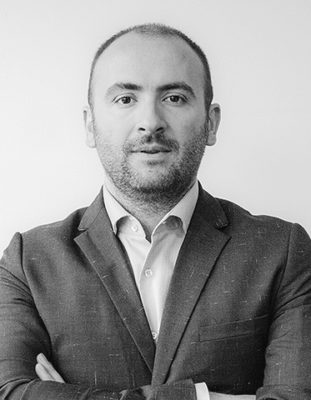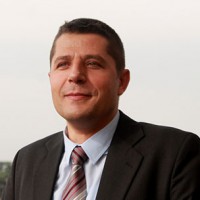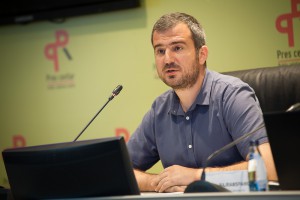Interview with Janis A. Emmanouilidis, Director of Studies of the European Policy Centre (EPC), Brussels
The biggest contribution and impact of the WeBER project relates to the fact that it has intensified the cooperation among a group of think tanks and civil society organisations in the Western Balkans. This cooperation has allowed the participating organisations to exchange experiences, especially through the WeBER Platform established during the project. The Platform has increased their role in the public administration reform area, both in their respective countries and in the region.
What are your impressions of the speed of the EU enlargement process in the Western Balkans, particularly after the EU Strategy for the WB and the Sofia and London Summits, as the WB governments still often feel a bit discouraged by the overall progress of the process?
The speed of the EU enlargement process in the Western Balkans has clearly slowed down in the last decade. Following the last rounds of EU widening and many years of internal crises since 2008, most national governments and public opinions have become more critical towards increasing the number of member states. However, in the course of the past year one can witness a new momentum. Whether this will actually lead to an acceleration of the accession process will depend on two key developments. First, on the willingness and ability of the accession countries to further advance political and economic reforms to meet the accession criteria. Second, on the political will and ability of the EU27 to reform the Union in key areas in order to sustainably overcome the so-called poly-crisis the EU and its members have witnessed. In other words, the Union’s internal attractiveness and effectiveness will to a large extent determine the readiness of governments and citizens to further expand towards the countries of the Western Balkans.
What are the biggest challenges that civil society in the EU faces today and what obstacles has the EPC been forced to overcome?
The biggest challenge that today’s civil societies are facing relate to the surge in authoritarian populism that is testing the basic foundations of our liberal democracies. The influence of political forces and movements advocating simplistic solutions to complex problems is expanding, with their political rhetoric and ideology framing or even dominating public discourse. Europe is at the risk of becoming more introverted, backward-looking, protectionist, intolerant, xenophobic, and discriminatory as well as more inclined to oppose globalisation, open trade, migration, heterogeneity, cultural diversity, and the principles of an open society. Albeit not confined to Europe, this threat is more fundamental for the European Union given that the EU is still much more vulnerable than its constituent parts. The EPC has early on acknowledged this worrisome development and has over the past years tried its best to raise awareness in Brussels and in the member states for this fundamental challenge. It has also worked on ideas how to move Europe forward through a set of concrete proposals reflecting the different interests and concerns of different member states and citizens.

Janis A. Emmanouilidis, Director of Studies of the European Policy Centre (EPC), Brussels
Your organisation closely cooperates with the Think for Europe Network (TEN), mostly by giving mentor support of a think tank with great experience. How do you see the future of the TEN network and how can the Network be further enhanced?
The Think for Europe Network (TEN) of think tanks and research centres in South East Europe is already a very successful initiative. It has managed to intensify regional cooperation in EU related policy research and intensified the links between think tanks and research centres in the Western Balkans with their counterparts in other parts of Europe. This has fostered the exchange of information between the members of the TEN network, enhanced their individual and collective expertise, allowed an exchange of best practices among themselves and with their peers in the EU, improved the quality and outreach of policy research, helped to develop and implement joint projects, and promoted national and transnational dialogues on different issues of common concern. These efforts are a strong basis to further intensify the capacity of civil society actors to have an impact on policy making at home as well as in Brussels and other EU capitals. The TEN network should use its combined strength to further enhance the presence of think tanks and research centres at the European level. This would not only enhance their individual and collective influence in the EU, it would also in return increase their ability to foster debates and improve policy-making processes at home, if actors on the ground are aware of their influence beyond national borders.
What would you single out to be the biggest contribution and impact of the WeBER project in the Western Balkan states?
The biggest contribution and impact of the WeBER project relates to the fact that it has intensified the cooperation among a group of think tanks and civil society organisations (CSOs) in the Western Balkans. This cooperation has allowed the participating organisations to exchange experiences, especially through the WeBER Platform established during the project. The Platform has increased their role in the public administration reform (PAR) area, both in their respective countries and in the region. WeBER Platform has allowed the participating partners to enhance their impact when it comes to PAR, as it gathers more than 180 CSOs from the region and serves as the venue for evidence-based dialogue between them, the government representatives, and international and regional organisations. Finally, the project has enabled think tanks from the TEN to collaborate and profit from the Brussels experience of the European Policy Centre. Likewise, the EPC also profited from the WeBER project given that it has allowed it to intensify its ties with peers in the Western Balkans and to further enhance its understanding of the situation in the applicant countries in South East Europe, which is important for the success of future rounds of EU enlargement.



